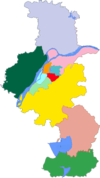南京理工大学 | |||||||
 | |||||||
Former name | Artillery Engineering College of the PLA (炮兵工程学院); East China Institute of Engineering (华东工程学院); East China Institute of Technology (华东工学院) | ||||||
|---|---|---|---|---|---|---|---|
| Motto | 进德修业 志道鼎新 | ||||||
Motto in English | Enhancing moral characters, Delving into knowledge, Seeking truth, Innovating | ||||||
| Type | Public | ||||||
| Established | 1953 | ||||||
| President | Fu Mengyin[1] | ||||||
| Vice-president | |||||||
Academic staff | 2,078[2] | ||||||
| Students | 27,063[2] | ||||||
| Undergraduates | 16,159[2] | ||||||
| Postgraduates | 8,021[2] | ||||||
| 1,836[2] | |||||||
| Address | 200 Xiaolingwei Street, Xuanwu District , , , 210094 , China 32°1′59.88″N 118°51′6.92″E / 32.0333000°N 118.8519222°E | ||||||
| Campus | Suburban | ||||||
| Colors | Purple | ||||||
| Affiliations | Sino-Spanish University Alliance (SSU) | ||||||
| Website | njust.edu.cn | ||||||
 | |||||||
| Chinese name | |||||||
| Simplified Chinese | 南京理工大学 | ||||||
| Traditional Chinese | 南京理工大學 | ||||||
| |||||||
The Nanjing University of Science and Technology (NJUST; 南京理工大学) is a provincial public university in Xuanwu, Nanjing, Jiangsu, China. It is affiliated with the Ministry of Industry and Information Technology, and co-sponsored with the Ministry of Education and the Jiangsu Provincial Government. The university is part of Project 211 and the Double First-Class Construction.
History
The Nanjing University of Science and Technology can be traced back to 1953, as Department of Artillery Engineering of Institute of Military Engineering of the PLA (People's Liberation Army) in Harbin. Since its establishment, it aims on serving national strategies and promoting social progress. In 1962, the campus moved to Nanjing. The name of the university changed many times, and finally determined as current name in 1993. In September 1998, the name on the school badge was inscribed by Chinese President and General Secretary of the Communist Party Jiang Zemin.[3] Since June 2008, the Nanjing University of Science and Technology has been subordinated to the Ministry of Industry and Information Technology.
Evolution of the Nanjing University of Science and Technology since 1953
| |||||||||||||||||||||||||||||||||||||||||||||||||||||||||||||||||||||||||||||||||||||||||||||||||||||||||||||||||||||||||||||||||||||||||||||||||||||||||||||||||||||||||||||||||||||||||||||||||||||||||||||||||||||||||||||||||||||||||||||||||||||||||||||||||||||||||||||||||||||||||||||
|---|---|---|---|---|---|---|---|---|---|---|---|---|---|---|---|---|---|---|---|---|---|---|---|---|---|---|---|---|---|---|---|---|---|---|---|---|---|---|---|---|---|---|---|---|---|---|---|---|---|---|---|---|---|---|---|---|---|---|---|---|---|---|---|---|---|---|---|---|---|---|---|---|---|---|---|---|---|---|---|---|---|---|---|---|---|---|---|---|---|---|---|---|---|---|---|---|---|---|---|---|---|---|---|---|---|---|---|---|---|---|---|---|---|---|---|---|---|---|---|---|---|---|---|---|---|---|---|---|---|---|---|---|---|---|---|---|---|---|---|---|---|---|---|---|---|---|---|---|---|---|---|---|---|---|---|---|---|---|---|---|---|---|---|---|---|---|---|---|---|---|---|---|---|---|---|---|---|---|---|---|---|---|---|---|---|---|---|---|---|---|---|---|---|---|---|---|---|---|---|---|---|---|---|---|---|---|---|---|---|---|---|---|---|---|---|---|---|---|---|---|---|---|---|---|---|---|---|---|---|---|---|---|---|---|---|---|---|---|---|---|---|---|---|---|---|---|---|---|---|---|---|---|---|---|---|---|---|---|---|---|---|---|---|---|---|---|---|---|---|---|---|---|---|---|---|---|---|---|---|---|---|---|---|---|---|
| |||||||||||||||||||||||||||||||||||||||||||||||||||||||||||||||||||||||||||||||||||||||||||||||||||||||||||||||||||||||||||||||||||||||||||||||||||||||||||||||||||||||||||||||||||||||||||||||||||||||||||||||||||||||||||||||||||||||||||||||||||||||||||||||||||||||||||||||||||||||||||||
Academics
The Nanjing University of Science and Technology is a multidisciplinary university, comprising academic fields including science, engineering, liberal arts, economics, business, management, law and education. In addition, it encompasses a wide array of centers, institutes, programs, and administrative support offices. It carries on its education and research on both undergraduate and postgraduate levels in 15 schools, led by a total of 70 undergraduate majors, 116 master programs and 49 doctoral programs, and 14 post-doctoral research stations.[citation needed]
NJUST is one of the Seven Sons of National Defence.[4]
Funding Schemes
The Nanjing University of Science and Technology has become a National Key University of Project 211 in 1995. In 2000, the Ministry of Education approved NJUST to start the graduate school. Later in 2011, the university was authorized to build 985 Advantage Discipline Innovation Platform.[5]
In September 2017, the Nanjing University of Science and Technology was included in the Chinese state Double First-Class Construction identified by the Ministry of Education of China.[6]
Schools and departments
As of June 2018, the Nanjing University of Science and Technology has the following colleges and schools:
- School of Mechanical Engineering
- School of Chemical Engineering
- School of Electronic Engineering and Optoelectronic Technology
- School of Computer Science and Technology
- School of Economics and Management
- School of Energy and Power Engineering
- School of Automation
- School of Science
- School of Foreign Studies
- School of Public Affairs
- School of Materials Science and Engineering
- School of Environmental and Biological Engineering
- School of Design and Communication
- Tsien Hsue-Shen College][7]
- School of Intellectual Property
- School of Marxism
- School of International Education
- School of Continuing Education
- Sino-French Engineer School
- Zijin College
- Taizhou Institute of Science and Technology
- Graduate School
Campus
Different from many universities in Nanjing, the Nanjing University of Science and Technology has only one main campus based in Xiaolingwei, Xuanwu District, on the south of Purple Mountain and the Sun Yat-sen Mausoleum.[8] It covers a total area of 3,118 mu[a] (207.87 ha).[5]

In 1998, Zijin College of NJUST was founded in Xianlin University City, Nanjing.[9] In June 2004, the Taizhou Institute of Science and Technology was founded in Taizhou, Jiangsu, as a branch institute of the Nanjing University of Science and Technology.[10]
Notable alumni
- Wang Zeshan, CAE member
- Ren Xinmin, aerospace engineer and specialist in astronautics and liquid rocket engine technology, CAS member
- Lu Ke, material scientist, CAS member
- Lu Zhangong, Vice Chairman of the Chinese People's Political Consultative Conference
Notes
- ^ mu (亩) is a Chinese unit of measuring area, 1 mu = 614.4 m2 = 734.82 sq yd
References
- ^ a b c d "Administration". english.njust.edu.cn. Retrieved 7 May 2022.
- ^ a b c d e "By the Numbers". english.njust.edu.cn. Retrieved 7 May 2022.
- ^ 你知道这些高等学府都是谁题的名吗?. Sohu (in Chinese). 15 November 2013. Retrieved 15 August 2018.
- ^ Cong, Forest (4 June 2020). "US Ban on Chinese Students With Military Links Divides Experts on Impact". Voice of America. Retrieved 15 June 2021.
- ^ a b "学校简介". njust.edu.cn (in Chinese). April 2020. Retrieved 7 May 2022.
- ^ 教育部 财政部 国家发展改革委关于公布世界一流大学和一流学科建设高校及建设学科名单的通知. moe.gov.cn (in Chinese). Ministry of Education of the People's Republic of China. 21 September 2017. Retrieved 15 August 2018.
- ^ "学院简介". qxs.njust.edu.cn (in Chinese). Retrieved 7 May 2022.
- ^ "Campus". english.njust.edu.cn. Archived from the original on 7 June 2019. Retrieved 7 May 2022.
- ^ "紫金学院简介". zj.njust.edu.cn (in Chinese). Archived from the original on 3 August 2018. Retrieved 7 May 2022.
- ^ 学校简介. nustti.edu.cn (in Chinese). May 2020. Archived from the original on 15 September 2020. Retrieved 7 May 2022.
External links









